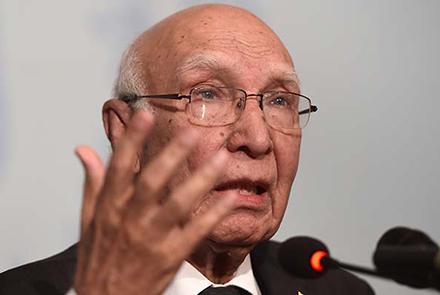Pakistan's national security advisor Sartaj Aziz has told Pakistani media that Islamabad and Kabul have started negotiating a mechanism for addressing each other’s concerns over terrorism.
“Both sides have said that terrorism is a common enemy and both sides agree that there should be cooperation for dealing with this issue. We are holding discussions for a joint mechanism,” Aziz said at a media briefing on the upcoming Economic Cooperation Organization (ECO) summit.
Both countries have accused each other of sheltering terrorists and the issue once again came to the fore after a suicide blast at the Lal Shahbaz Qalandar shrine in Sindh that killed 75 people.
Pakistan closed the border crossings with Afghanistan, demanded the handover of 76 wanted terrorists and shelled terrorist hideouts on the Afghan side of the border.
In response, Afghanistan handed Pakistan the names of 85 leaders of Taliban, Haqqani Network and other terrorist groups and insisted that action be taken against 32 alleged terrorist training centers in Pakistan.
Afghanistan also warned that continued violence would compel it to seek international sanctions against “terrorist groups and their supporters”.
Last week, Afghanistan’s Ministry of Foreign Affairs (MoFA) said Pakistan officials have promised they will arrest and extradite to Afghanistan those terrorists whose names have been listed by Kabul and submitted to Islamabad.
The Afghan ambassador to Pakistan, Omar Zakhilwal, meanwhile said he is discussing with Pakistan officials on a range of issues including Pakistan’s missile attacks on parts of Afghanistan; the reopening of Torkham port; and presence of insurgents on Pakistan soil. He hoped an agreement will be reached soon.
After Pakistan’s cross-border attack, the Ministry of Defense (MoD) warned that Pakistan’s missile attacks on the eastern regions of the country would have serious consequences, suggesting that a diplomatic solution of the issues between the two neighbors needed to be found.


